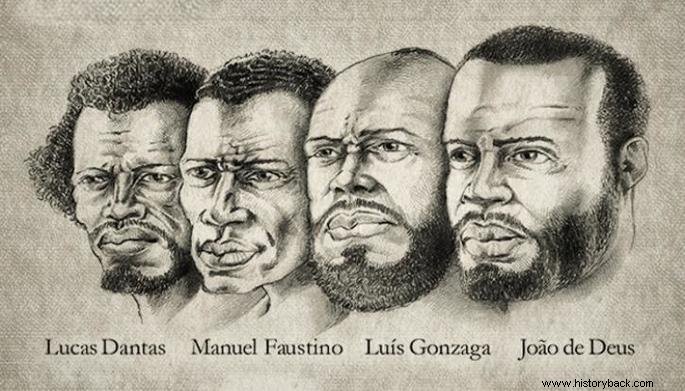The Bahia Conjuration or Revolta dos Alfaiates was a popular political movement that took place in Salvador, Bahia, in 1798.
Its objectives were to separate Bahia from Portugal, abolish slavery and meet the demands of the poorer strata of the population.
It is also known as "Conspiração dos Búzios" or "Revolt of the Tailors", for having as main leaders the tailors João de Deus and Manuel Faustino dos Santos Lira.
The Conjuração Baiana was composed, for the most part, by enslaved, free blacks, poor whites and mestizos, who exercised the most different professions, such as shoemakers, bricklayers, soldiers, etc.
Influenced by the French Revolution and the Haitian Revolution, the Conjuração Baiana was strongly repressed. Its members were arrested and, in 1799, the movement's leaders were sentenced to death or banishment.
Leaders of the Bahia Conjuration
In addition to the leadership exercised by the tailors, the movement was also led by soldiers Luís Gonzaga das Virgens and Lucas Dantas.

Freemasonry exerted a strong influence on the conspiracy, as the political ideals of the French Revolution also reached Brazil through this group.
The first Masonic lodge created in Bahia, Cavaleiros da Luz, had the participation of several intellectuals who were involved in the conspiracy.
They are:José da Silva Lisboa, future Viscount of Cairu; the surgeon Cipriano Barata, the "doctor of the poor"; pharmacist João Ladislau de Figueiredo; Father Francisco Gomes; the Latin professor Francisco Barreto and the lieutenant Hermógenes Pantoja, who gathered to read Voltaire, translate Rousseau and organize the conspiracy.
Historical context of the Baiana Conjuration
In the same way, the movement led by the freed man Toussaint Louverture, in Haiti, against the French colonizers, had repercussions in Bahia - the first great uprising of successful slaves in history.
Another cause that led to the revolt was the fact that the population of the city of Salvador was in a situation of penury, after the capital of colonial Brazil was transferred to Rio de Janeiro, in 1763. The need to found a republic in Bahia was affirmed. Democratic, where there were no social differences and where everyone was equal.
On August 12, 1798, the city of Salvador dawned covered with manuscript papers nailed to the walls of churches. The pamphlets called the population to fight and proclaimed ideas of liberty, equality, fraternity and the Republic.
One of the main sayings was:
End of the Bahia Conjuration
The distribution of pamphlets with slogans led the authorities to act promptly and suppress the demonstration. Some members were arrested and forced to report the rest of the participants.
The governor of Bahia, Fernando José de Portugal e Castro, learned through a denunciation made by Carlos Baltasar da Silveira, that the conspirators would meet in Campo de Dique, on August 25th.
The government's action was quick and Colonel Teotônio de Souza was charged with catching them in the act. Faced with the approach of government troops, some managed to flee.
Once the rebellion was suppressed, the arrests followed one another and the movement was dismantled. 49 people were arrested, of which three were women, nine were enslaved and other free men who worked as tailors, barbers, soldiers, embroiderers and small traders.
The main perpetrators were tried and sentenced to death. On November 8, 1799, one year and two months after the events, the accused were found guilty of treason.
In this way, they received the death penalty by hanging and then quartered:Luís Gonzaga das Virgens, Lucas Dantas, João de Deus and Manuel Faustino dos Santos Lira. The bodies were exposed in several places in the city of Salvador to serve as an example to possible subversives.
The intellectuals and members of Freemasonry who participated in the conspiracy received lighter sentences or were acquitted.
Despite its terrible outcome, the Conjuração Baiana influenced other movements such as independence (1822), the Malês Revolt (1835) and the abolition of slavery (1888).
See also :
- Mining Conspiracy
- Independence of Haiti
- Abolitionism
- Male Revolt
- Exercises Colonial Brazil
